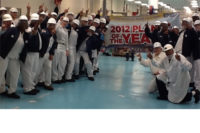“Consumers and customers know they can count on Mars’ quality in our products. Therefore, our in-house and supplier audits are thorough and continually renewing. Our goal is to continually raise the bar on our audits and to welcome them as a way for improvement,” Hall says.
For example, in-house audits are conducted weekly, with experienced associates auditing and looking at systems from a new perspective. The company’s “Peer Assists” concept is an in-depth review of systems by peers directly related to specific processes in order to look for new methods, materials and ideas for improvement.
“These have been very effective and allow us to compare and contrast, giving us the opportunity to pick the best ideas for improvement,” Hall says.
Safety practices
As for safety, the company encourages employees to suggest new safety features or improve existing ones. The company evaluates suggestions from the standpoint of compliance and effectiveness. An interdepartmental group follows up on each suggestion to ensure that long-term, user-friendly corrective actions are implemented and maintained.
Mars Ice Cream used to have an on-site lab, but based on its Efficiency principle, it turned to outside labs for analysis. Mars tests for microbiological controls and analytical measurements.
“Since Quality is our first principle, food safety is foremost on our quality agenda,” Latham says. Standard practices include in-line checks, daily quality reviews and a thorough review of all incoming raw materials (including daily sensory reviews and certificates of analysis).
“We also have strict standards for transportation, packaging, code dating and traceability for all raw materials as well as finished products. From start to finish, food safety is built into our products, packaging and transportation to ensure our products are safe and wholesome for all consumers,” she says.
Last November, corporate parent Mars Inc. pledged $500,000 to the Global Food Safety Multi Donor Trust Fund, which is managed by The World Bank. The fund is a public-private partnership that aims to expand knowledge and understanding for effective food safety management around the world.
Mars Inc. also has ambitious sustainability goals for the entire company. Key targets include cutting greenhouse gas emissions from factories and offices to zero by 2040. The company states it plans to achieve the goal through “absolute emission reductions, without the use of carbon offsets and regardless of business growth.”
The Burr Ridge plant follows sustainable manufacturing processes to reduce its carbon footprint. In 2010, it achieved a 95% landfill-free status. The electricity saved through energy-saving initiatives since 2005 could power 1,400 homes annually, Latham says. Other green practices include the use of laser coding, which eliminates ink, and using scrap ingredients for animal feed.






